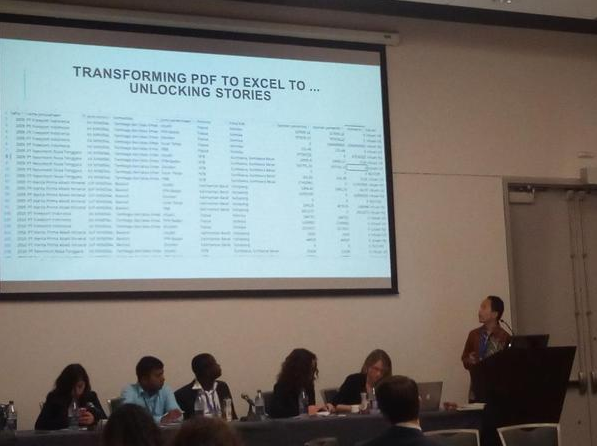
PWYP Indonesia was in the 3rd International Open Data Conference, presented impacts and progress of Open Data in extractive industry. The event was held in Ottawa, Canada from 28-29 May, 2015. In a session called Data + Extractive, PWYP Indonesia presented showcase of how open data has positively affected efficacy of existing advocacy of governance in the extractive industry such as mining, oil, gas, and forestry.
Using existing data provided by Extractive Industry Transparency Initiative (EITI), PWYP through its coalition member who spread across the country were able to better monitor production and payments made by mining companies; indigenous communities able to access various document such as environmental assessment and corporate social responsibility document; or able to crosschecking value of revenue share transferred from central to local government, as well as able to monitor performance of spending.
In the presentation, PWYP Indonesia’s program manager JensiSartin, said that civil society advocates can take benefit from the advancement of ICT as well as fast growing movement of open data. “We should ride the wave of open data” said Jensi. However, as Jensi explained, we should not be drowned into the potential amount of data unlocked by this open data movement nor overwhelmed by the technology itself. “In the end, we have to aware that in our context (extractive sector), in many cases, those who impacted most by the extractive sector are those who have no adequate access to such technology”.
As Jensi later gave example of a PWYP pilot-area whom access to communication is very limited. “I remember the chief of village felt sorry because he was not able to reply my urgent text immediately. I asked why? He said that to receive mobile phone signal he must walk out of the village to a certain place, then climbs a coconut tree, stay up there while receiving and replying text messages”. Thus, civil society advocates must bridge this kind of gap. “I even think that we still need to allocate our resources on expanding access before advancing technology” Jens said.
However, based on current progress in open data application in extractive sector in Indonesia, Jensi believe that there are wide open opportunity for public to use open data as one of tool to improve governance of extractive sector as well as advocating their rights. “We are dreaming about linked data format, where licensing data system is interlinked with production data in mining agency, interlinked with revenue data, and interlinked with spending and performance data both in central and regional government”, said Jensi. “Such system should be open up for public access, where I and my friends in deep tropical forest in Kalimantan can monitor how bauxite mining in our neighborhood contribute to development of our village”.
Lesson learnt piloted by PWYP Indonesia and Swandiri Institute showed that community monitoring can play significant roles in oversee extractive industry that is mostly “impossible” to be adequately monitored by authority. Arif Munandar in his presentation in the same session in the conference showed that participatory mapping using drone technology is effective and efficient to determine practises of extractive sector. “Using self-made drones, we can monitor and map hectares of forests and mining operations in the most money-wise way”. Through the mapping, Swandiri Institute and local Dayak communities able to identify various flaws in regional spatial planning, overlapped of mining license and forest protection, land grabbing and environmental destruction by mining companies.
Finally, PWYP Indonesia and Swandiri Institute plan to replicate and scale up the pilot project in West Kalimantan to cover more provinces accross in Indonesia. Click here for further information on this project, and a brief of the presentation here or contact:sekretariat at pwyp-indonesia.org